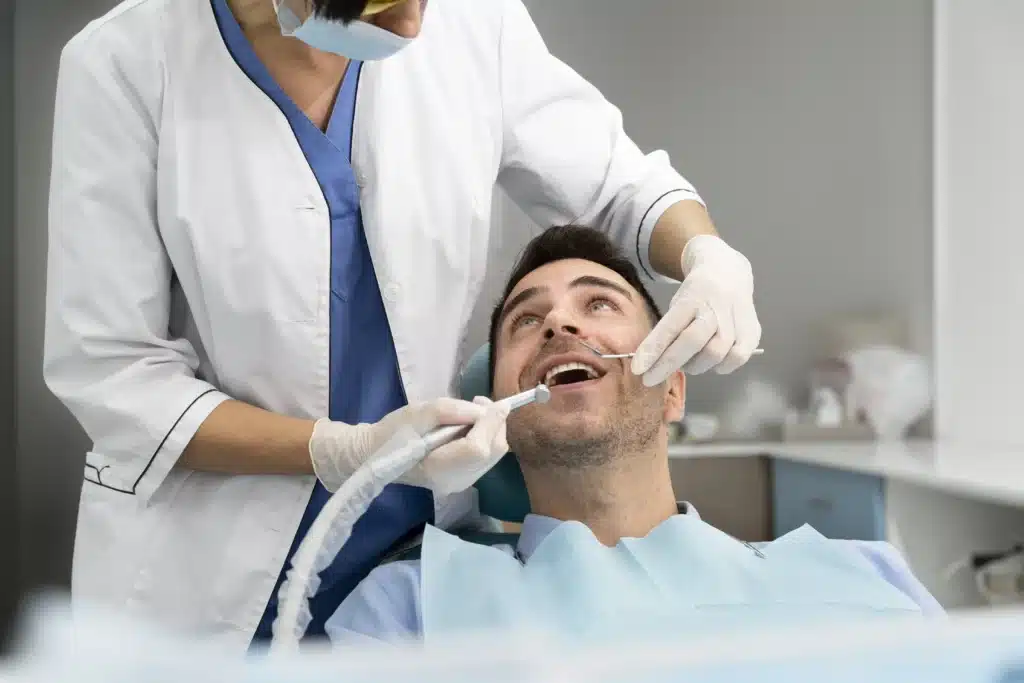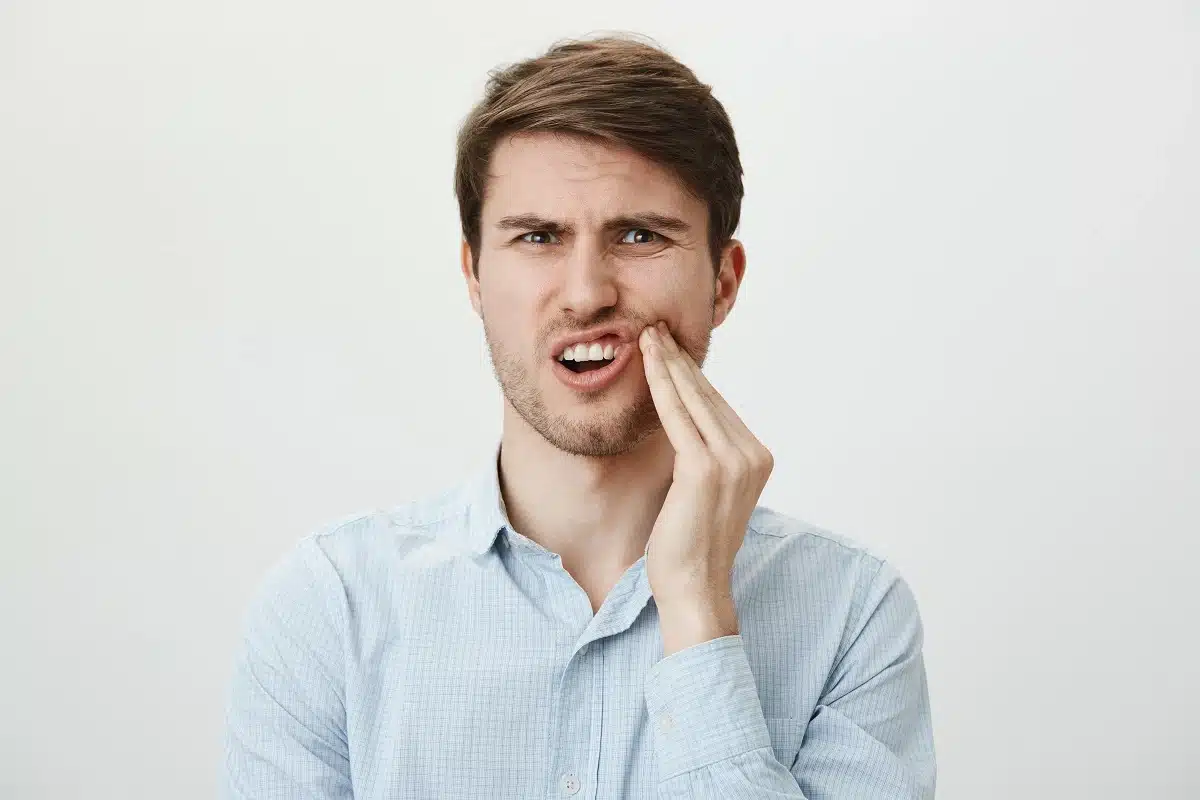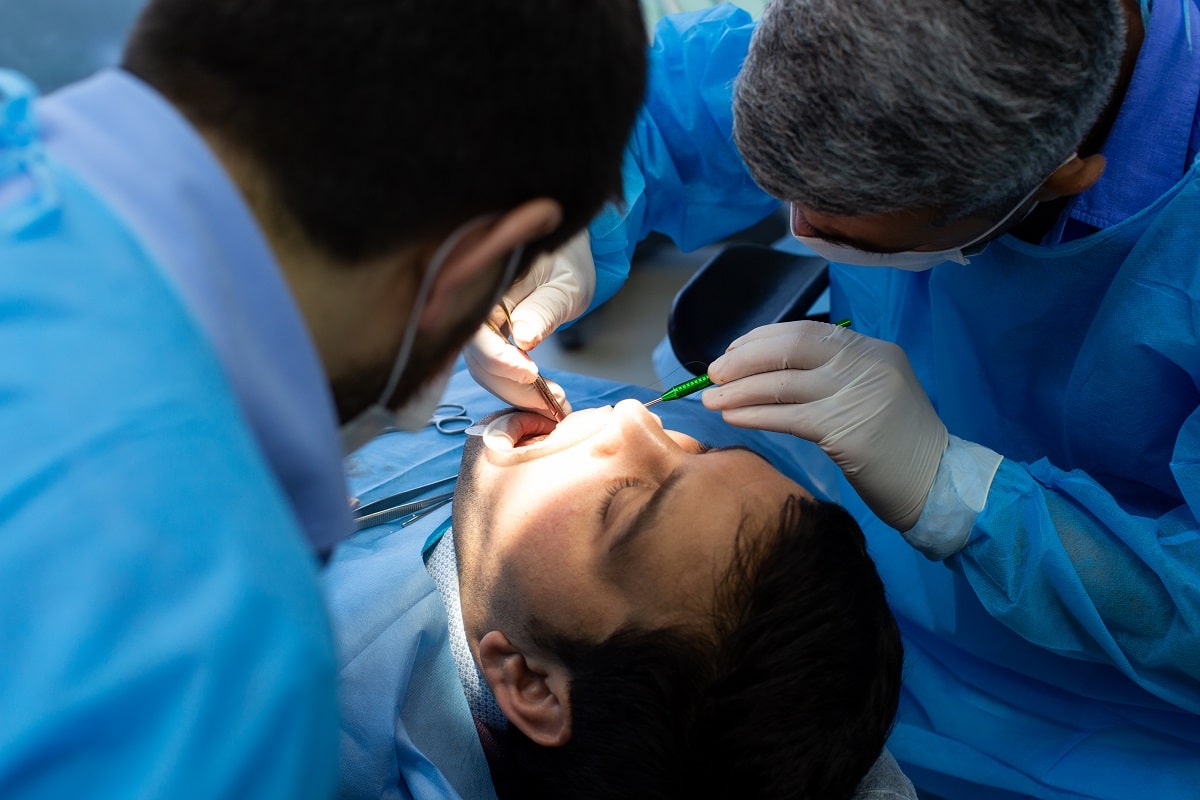Have you ever wondered what goes on during your professional dental cleaning? From the scraping to the polishing, there’s a lot more to it than just a quick floss and rinse. Join us as we take you behind the scenes of your next visit to the dentist’s chair and uncover all the secrets of what happens during your professional dental cleaning.
Get ready to see why regular cleanings are so important for keeping your smile bright and healthy!
Professional Dental Cleanings
Maintaining good oral hygiene is essential for overall health and well-being. One of the key components of proper oral hygiene is regular professional dental cleanings. While brushing and flossing at home are crucial, they cannot replace the deep cleaning that can only be done by a dental professional.
A professional dental cleaning, also known as prophylaxis, is a thorough process that removes plaque, tartar, and stains from your teeth. It involves several steps performed by a licensed dental hygienist or dentist to ensure your teeth and gums are healthy and free from any harmful bacteria build-up.
In this section, we will take an in-depth look at what happens during a professional dental cleaning appointment
The Process of Professional Dental Cleaning
- Physical Exam: The first step in any professional dental cleaning is a physical examination. Your dentist or hygienist will visually inspect your mouth, teeth, and gums for any signs of decay or infection.
- Removing Plaque and Tartar: Once the initial exam is complete, the next step involves removing plaque and tartar from your teeth using special tools such as scalers and curettes. These instruments allow them to access areas that are hard to reach with regular brushing or flossing.
- Teeth Polishing: After removing all traces of plaque and tartar, your dentist will proceed with polishing your teeth using a gritty paste and a high-powered electric brush. This helps remove any remaining stains on your teeth’s surface leaving them smooth and shiny.
- Flossing: Once your teeth have been thoroughly cleaned and polished, it’s time for flossing. Your dentist will use floss to clean between each tooth to remove any debris or plaque left behind.
- Fluoride Treatment: In some cases, dentists recommend fluoride treatment after completing the cleaning process to strengthen enamel against cavities.
- Educating on Proper Oral Hygiene: The last step in professional dental cleaning is educating patients on proper oral hygiene techniques. Your dentist or hygienist will provide you with tips and advice on how to maintain good oral health at home.
Benefits of Professional Dental Cleanings
- Regular professional dental cleanings offer many benefits, including:
- Prevention of tooth decay and gum disease
- Fresher breath
- Removal of stains for a brighter smile
- Early detection of any potential dental issues Improved overall health and well-being
Why they are important
Regular dental cleanings are vital for oral health, preventing issues like plaque and tartar buildup, gum disease, and bad breath. These cleanings also aid in the early detection of dental problems, including oral cancer, saving on potentially costly treatments. Maintaining overall health is another benefit, as poor oral health has been linked to systemic diseases. The frequency of professional cleanings varies based on factors like age, oral health, and medical conditions, with a general recommendation of every six months. Consult with your dentist to determine the optimal cleaning schedule tailored to your unique needs.
What to Expect During Your Dental Cleaning
Dental cleanings are vital for good oral health and preventing issues like cavities and keep you away from treatment for gum disease. If you’re unsure about what happens during one, here’s what to expect
- Examination: Your dentist checks for decay, gum disease, and other oral issues
- Plaque and Tartar Removal: Using special tools, they remove plaque and tartar buildup.
- Polishing: Teeth are polished to remove stains, leaving them smooth and shiny.
- Flossing: Ensures thorough removal of food particles and debris between teeth.
- X-rays (If needed): New X-rays may be taken to examine teeth and jawbone.
- Fluoride Treatment: Strengthens enamel and protects against decay.
The procedure takes 30-45 minutes. Afterward, you might experience slight sensitivity or soreness in your gums, which should subside in a day or two.
Regular cleanings every six months are essential for optimal dental care and hygiene.
Step-by-Step Process
Dental Cleaning Process: The procedure begins with a comprehensive oral examination by the Dentists In Keysborough or hygienist, identifying signs of decay, gum disease, or other oral health issues.
2. Plaque and Tartar Removal: Using a scaler tool, the next step involves eliminating plaque and tartar, preventing tooth decay and gum disease. Tartar, a hardened form of plaque, is particularly targeted.
3. Polishing: After plaque and tartar removal, teeth undergo polishing with an electric brush and abrasive toothpaste to eliminate surface stains, leaving them smooth.
4. Flossing: Dental hygienists floss between teeth to remove remaining particles or debris.
5. Fluoride Treatment: Optional fluoride treatment strengthens tooth enamel, protecting against cavities.
6. X-rays (if necessary): X-rays may be recommended for detecting underlying issues like impacted wisdom teeth or bone loss.
7. Mouth Rinse: A liquid antibacterial mouth rinse may be provided to kill germs.
8. Review Oral Care Routine: The dentist or hygienist reviews proper brushing techniques and offers recommendations for maintaining oral hygiene at home.
9. Follow-up Appointment: Depending on the examination results, a follow-up appointment for necessary treatments may be recommended.
10. Final Check: A final check ensures everything looks good, addressing any remaining concerns.
Common Procedures and Treatments
During a dental cleaning, expect an oral examination to assess cavities and gum health. The removal of tartar and plaque follows, preventing tooth decay and gum disease. Teeth polishing eliminates stains, and professional flossing ensures thorough cleaning between teeth. Fluoride treatment strengthens enamel, and X-rays may be taken for a comprehensive assessment. Gum disease treatment is provided if needed. Regular dental cleanings are crucial for oral health and personalised at-home care recommendations from your dentist are essential for prevention.
Benefits of Regular Dental Cleanings
Regular dental cleanings are crucial for good oral hygiene and overall health. While daily brushing and flossing are essential, professional cleanings provide additional benefits. They prevent cavities by removing plaque buildup, reducing the risk of tooth decay. Cleanings also help prevent gum disease by eliminating plaque above and below the gumline, reducing inflammation.
Moreover, regular cleanings result in fresher breath by removing food particles and bacteria. They contribute to overall health by preventing issues like heart disease, stroke, diabetes complications, respiratory problems, and pregnancy complications associated with poor oral hygiene. Dental cleanings include an oral cancer screening, and detecting early signs for timely intervention.
Maintaining regular cleanings can save money by preventing costly treatments like fillings, Root Canal Treatment, or extractions. Beyond a clean smile, these cleanings play a vital role in preventing oral health problems and promoting overall well-being. Schedule your next professional cleaning appointment to enjoy these benefits.
Prevention of cavities and gum disease
Regular dental cleanings are vital for preventing cavities and gum disease. During this procedure, your dentist removes plaque and tartar, key contributors to dental issues. Plaque, a bacterial film on teeth, can cause cavities if not addressed. Special tools are used to gently remove hardened plaque (tartar), preventing cavities and halting their progression.
Gum disease starts with gingivitis and can lead to serious issues like tooth loss. During a dental cleaning, your dentist checks for signs of gum disease by measuring pockets between gums and teeth. If issues are detected, a deep cleaning called scaling and root planning may be recommended to remove bacteria below the gum line.
Fluoride treatments during dental cleanings are crucial for strengthening tooth enamel against bacterial acid attacks. Fluoride applied as a gel, foam, or varnish, acts as a protective shield. This is especially beneficial for children with developing teeth that are more prone to cavities.
Your dentist may also discuss proper brushing and flossing techniques, recommend mouthwash, and provide dietary advice. Prioritising regular dental cleanings and maintaining good oral hygiene practices significantly reduces the risk of common dental problems.
Better oral hygiene and fresher breath
Professional dental cleanings are essential for achieving better oral hygiene and fresher breath. During a cleaning, plaque and tartar are expertly removed, preventing tooth decay and gum disease. Flossing targets hard-to-reach areas, maintaining overall oral health. The hygienist polishes teeth to a shiny, stain-free finish. These cleanings also enable early detection of oral issues, preventing more serious conditions. Additionally, they eliminate bad breath by reducing bacteria in the mouth. Regular cleanings every six months are recommended for optimal oral health.
Potential cost savings in the long run
Professional dental cleanings are a worthwhile investment, not an unnecessary expense. While regular at-home oral care is crucial, it isn’t sufficient for long-term dental health. Investing in these cleanings can prevent major oral health issues, saving you money on future treatments. Key cost savings include preventing tooth decay, early detection of problems, improved overall health, optimised insurance benefits, and avoiding emergency visits. Don’t view professional dental cleanings as a small expense; they provide significant long-term savings by maintaining good oral health.
At Parkmore Family Dental, our commitment to your oral health goes beyond the ordinary. Wondering what unfolds during your professional dental cleaning at our practice? Our skilled dental hygienists kick off the session with a meticulous examination, identifying any underlying issues. Armed with specialised tools like scalers and curettes, they expertly remove plaque and tartar, the culprits behind tooth decay. The journey continues with a polishing session to smoothen tooth surfaces, reducing future buildup risks. Don’t forget the vital flossing demonstration – an essential step for maintaining optimal oral hygiene at home.
Depending on your needs, our team might recommend fluoride treatment, reinforcing enamel and fortifying against decay. At Parkmore Family Dental, our professional dental cleanings ensure a thorough, personalised experience, leaving your smile radiant and your oral health in top-notch condition.




